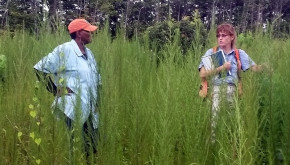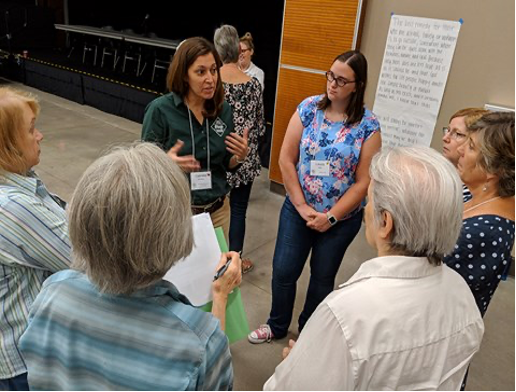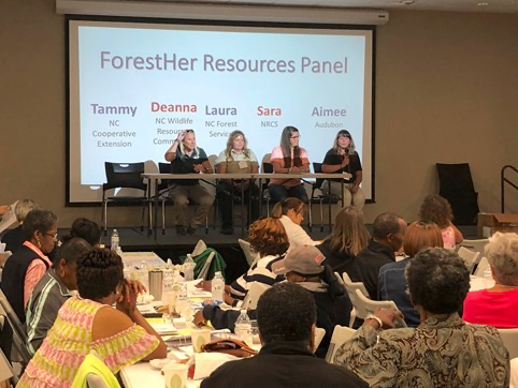
Consulting forester Elizabeth Barnhardt visits a ForestHer NC workshop attendee’s land to discuss reforestation after a timber harvest. Image courtesy of Alton Perry
By Susan Longest
Article from the USDA Forest Service Forest Stewardship Program
According to the U.S. Forest Service’s National Woodland Owners Survey, women make up a growing percentage of forest owners, and are increasingly becoming the primary decision-makers for their land and forests. Yet they are significantly less likely than men to attend and participate in forest management outreach and education events. ForestHer NC was founded in 2019 to address that problem by creating a safe and encouraging space for women in North Carolina to access resources and skills in forest management while building community with other women woodland owners
“Part of the driver is that women are the decision-makers on a significant part of the land, and part of the driver is that we don’t have comfortable places for women to ask questions and to feel like they belong,” said Leslie Purcell McCormick, executive director of the NC Tree Farm Program and a found- er of ForestHer NC.
To remedy this problem, ForestHer NC organized a series of six quarterly workshops across three regions of North Carolina to provide essential knowledge and resources for women woodland owners and to positively impact conservation on private lands. Nearly 500 attendees ranging in age from 23 to 90 participated in the first two sets of workshops in August and November 2019, demonstrating the strong need for women-focused programming in forest management. Of the participants, 20% manage land that has been in their families for over 100 years. Workshop attendees learned how to survey their property and determine the value of their trees. They also attended training in basic tree identification skills, forest management planning and practices, and forest health. Upcoming workshops will focus on management for wildlife, invasive plant identification, and native landscaping.
A North Carolina natural resource professional speaks with ForestHer NC workshop attendees in Piedmont, NC. (Image courtesy of Debbie Roos.)
Beyond educational resources, ForestHer NC helps women build a community of women landowners and natural resource professionals. The majority of workshop events are led by female natural resource professionals who educate women attendees about their local organizations and help give them the confidence to approach these organizations for help with their woodlands. One attendee noted, “I’m the only female farm owner I know...until now! This was empowering on both a business and human perspective.”
By learning the value of their woodlands, the women are better prepared to make sound business decisions regarding timber and land sales. Frances Sutton and her husband inherited family land and attended a ForestHer NC workshop to figure out how to make their goals of producing timber a reality.
“It was good because they give you a lot of information and tell you about what resources are out there and tell you how to do things so that people don’t take advantage of you,” Sutton said.
ForestHer NC is also working to increase access to education, training, and resources that historically have been denied to African-American woodland owners. Since 1910, approximately 95-97% of the roughly 15 million acres of land owned by African Americans in the south have been lost largely due to African-American landowners not having equal access to information or agencies and organizations that could assist them in managing their land.
A panel of female natural resource professionals speaks to women attendees at a ForestHer NC workshop in Kinston, NC. (Image courtesy of Aimee Tomcho.)
Alton Perry, Program Manager for Roanoke Electric Cooperative’s Sustainable Forestry and Land Retention Project, and ForestHer NC have partnered to ensure African-American women landowners have access to resources to turn their woodlands into assets rather than liabilities. Between 20 and 30 African-American women woodland owners from the Roanoke Electric Cooperative attended each of the two workshops in Kinston. Alton Perry believes that building these relationships and partnerships with ForestHer NC will ensure that the workshops and learning opportunities overall are diverse, equitable, and inclusive.
COVID-19 cut the workshop series short this year, but ForestHer NC is continuing to educate and em- power women through virtual workshops and Facebook until in-person meetings are possible again. Forester Laura Hendrick hopes to see women continuing to make a connection with their land.
“It's more than just where you set your house and have your garden. There's a lot of lessons in the woods,” says Hendrick. “If you connected with a piece of property and it's where your heart is and you make it your home and you get to see it grow and change. You get to harvest, then you get to see it replanted. I think it's just so rewarding to see that.”
ForestHer NC is supported by the U.S. Forest Service in collaboration with the N.C. Forest Service, N.C. Tree Farm Program, N.C. Wildlife Resources Commission, Audubon North Carolina, NC State Extension, N.C. Cooperative Extension, National Wild Turkey Federation, USDA, and the Sustainable Forestry and Land Retention Project.



